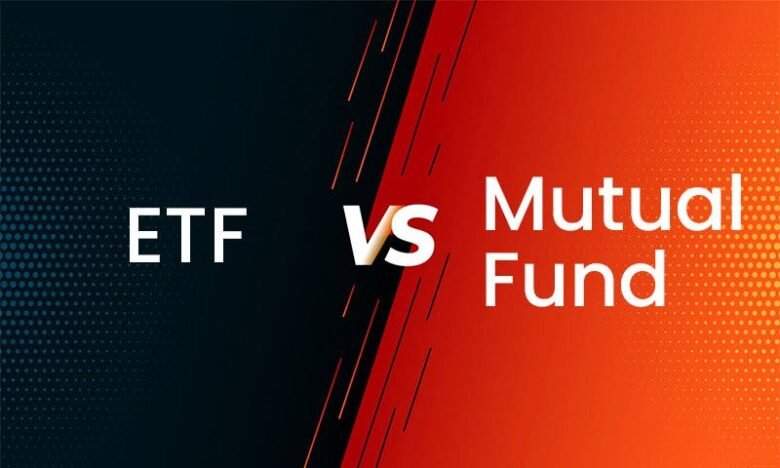When new investors first enter the investment world, they often hear about two types of funds: mutual funds and exchange-traded funds (ETFs). Both are popular with people who want to grow their capital without having to choose individual stocks. They also offer exposure to a wide range of assets. While it can be difficult to understand the difference between mutual funds and ETFs when you’re just starting to invest, once you’ve invested, it’s easy to determine which one best suits your financial goals.
What Mutual Funds Really Mean
Mutual funds are a way for many people to invest in various stocks, bonds, and other assets. Investors don’t have to worry about choosing a specific investment because professional fund managers make the buying and selling decisions. This makes mutual funds suitable for new investors and those who prefer not to make decisions themselves. Investors in mutual funds buy shares. The value of these shares rises or falls based on the performance of the investments held by the fund.
What ETFs Really Mean
Exchange-traded funds (ETFs) are similar to mutual funds in that they represent a diversified group of investments. However, unlike mutual funds, ETFs are traded on the stock exchange just like individual stocks. This means their prices can fluctuate throughout the trading day, and investors can buy and sell them whenever the market is open. ETFs are a simple and inexpensive way to invest in multiple companies simultaneously, as they often track specific indices, such as the S&P 500. This flexibility is attractive to beginners, as it allows for easy entry and exit.
Investing in Mutual Funds for Beginners
Retirement accounts, banks, and investment firms offer mutual funds, making it easy for new investors to get started. Automatic reinvestment is a major advantage of mutual funds. This means that dividends and interest automatically flow back into the fund without the investor having to do anything. Many believe this feature contributes to long-term growth. However, mutual funds often have minimum investment limits, making them less flexible and potentially unsuitable for beginners with smaller capital.
Investing in ETFs for Beginners
ETFs are ideal for beginners because they can be purchased through a brokerage account and have no minimum investment other than the price of a single share. ETFs also typically have lower costs than mutual funds, especially regarding expense ratios. ETFs are a good option for beginners because they are inexpensive and flexible. This is especially true for those who want to start with a small investment and grow it gradually. The ability to buy and sell ETFs throughout the trading day gives you more control.
Considerations Regarding Mutual Fund Costs
One disadvantage of mutual funds is that they cost money. Some mutual funds charge management fees to cover the fund manager’s expenses, and some even charge sales charges (commissions). These fees can reduce investor profits, especially over time. While professionally managed funds can also deliver strong performance, new investors should be aware that they may incur higher fees than ETFs.
Considerations Regarding ETF Costs
ETFs are generally considered a good investment because their expense ratios are typically lower than those of mutual funds. This is especially true for index ETFs, which passively track a market index instead of relying on active management. This allows a larger portion of the investor’s money to remain invested and grow while maintaining lower costs. For cost-conscious beginners, ETFs are often a good long-term investment option.
How Management Style Affects Investing
Mutual funds are typically actively managed, meaning that experienced managers decide which assets to buy and sell to outperform the market. ETFs, on the other hand, are typically passively managed, meaning they track a specific index without requiring a large investment. New investors should consider whether they want to rely on the fund manager’s expertise or follow market trends. Actively managed ETFs sometimes outperform, but passive ETFs generally offer consistent returns at lower costs.
Liquidity and Flexibility Differences
A key difference between mutual funds and ETFs is the ease of buying and selling. Investors have the same flexibility with ETFs as with individual stocks, as they can buy and sell ETFs at market prices throughout the trading day. However, mutual funds are priced only once per day, after the market closes, meaning investors can’t react to market changes as quickly as with ETFs. ETFs provide investors with greater direct control, whereas mutual funds provide a sense of security.
Risk Levels for Beginners
Both mutual funds and ETFs reduce risk by diversifying your money across various investments, making it less risky to rely on just one stock. On the other hand, the type of fund you choose affects the risk you take. For example, a mutual fund or ETF focused on bonds is safer but offers lower returns. On the other hand, a fund focused on stocks can offer higher returns but also carries greater risk. For beginners, it’s crucial to choose a fund that aligns with their goals, timeframe, and level of comfort with market fluctuations.
Conclusion
Both mutual funds and ETFs are excellent ways for beginners to get started investing, as they offer a wide range of options and are professionally managed. Those who prefer expert management without too much hassle may prefer mutual funds. Those who want more freedom, lower costs, and the ability to trade throughout the day may prefer ETFs. There’s no single answer for everyone, but the best decision depends on the investor’s goals, budget, and level of familiarity with market participation. Understanding the key differences can help beginners make better choices and begin their investing journey with greater clarity.
FAQs
1. What are the key differences between ETFs and mutual funds?
ETFs are often passively managed and trade on the exchange throughout the day. Mutual funds, on the other hand, are actively managed and have a daily price.
2. What’s cheaper, mutual funds or ETFs?
For many beginners, ETFs are a better choice because they typically have lower cost-to-expense ratios than mutual funds.
3. Do I need to invest a large amount in mutual funds or ETFs?
Mutual funds typically require a certain amount, but ETFs are priced at the price of a single share, making them easier for beginners to use.
4. Which is safer for beginners, mutual funds or ETFs?
Both can be safe, but it depends on the type of asset you’re investing in. Funds that invest in bonds are generally safer, while funds that invest in stocks are riskier but offer greater growth potential.
5. Can I buy both ETFs and mutual funds?
Yes, many investors use both to diversify their investments and get the most out of each type of investment.




